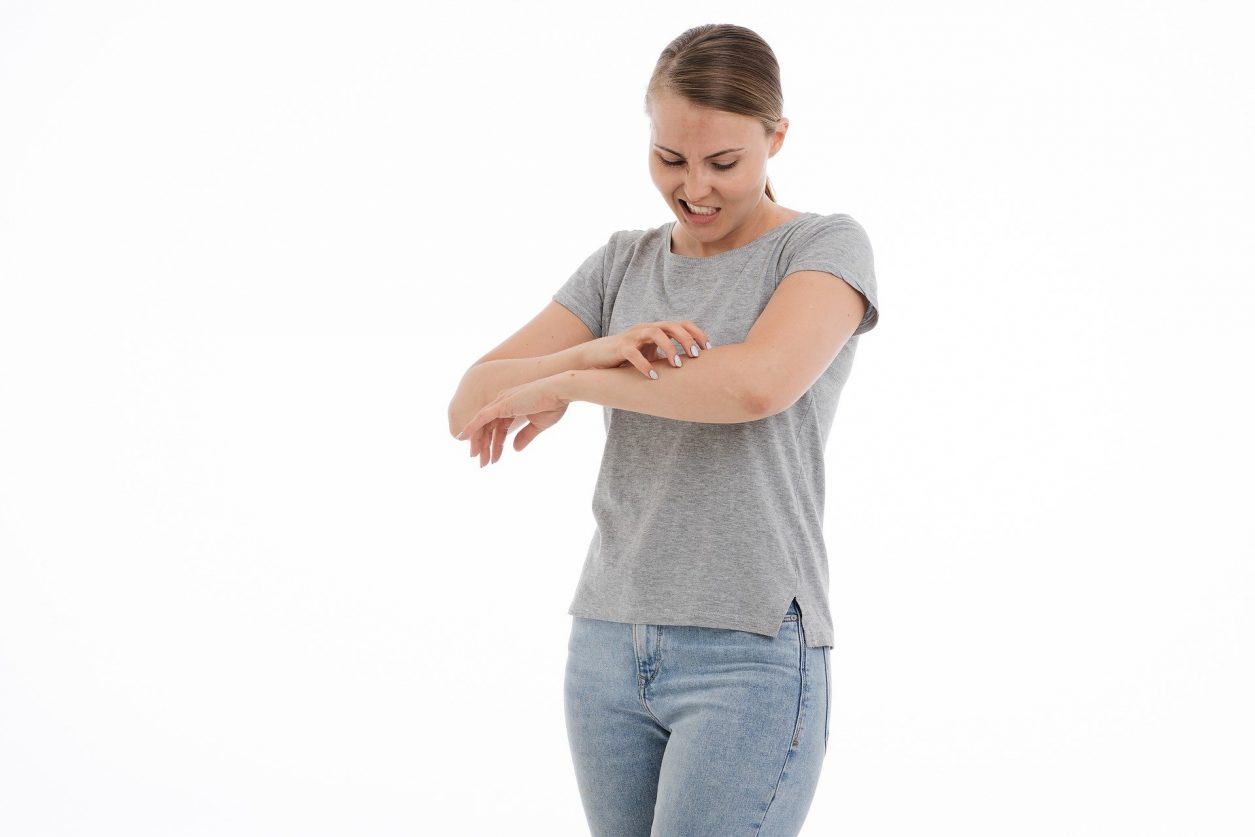
Cracked skin, rashes, weeping sores, and endless itching — that’s what people with skin disorders experience daily, sometimes over long stretches of time. An itch that doesn’t go away could drive anyone crazy. To get relief, it is important to identify the problem and find an effective treatment.
Why scratching an itch can make it even itchier
“Don’t scratch” is probably one of the most popular pieces of advice a person with itchy skin receives. Easier said than done, buddy. Putting nails to itching skin brings this sweet relief…which unfortunately doesn’t last long. The culprit of the vicious circle of itching-scratching-itching is serotonin.
When you scratch the skin, the brain in response begins to produce more serotonin to inhibit pain. So, the more itching you feel, the more pain you would like to create to counteract it. Instead of scratching, hold an ice cube or cool compress on the itchy area. It will interrupt itchy feelings and break the itch-scratch cycle.
Why makes skin itchy
Standard therapies, anti-inflammatory drugs, topical medications or antibiotics can help with some skin problems. However, sometimes itchy skin is the result of mental health issues. The weight of mental or emotional stress can lead to some serious skin disorders such as eczema, prurigo, psoriasis or atopic dermatitis.
The study, pu blished in the Journal of Investigative Dermatology, found that patients who reported having an itch as one of the symptoms are more likely to experience depression, suicidal ideation, and stress. Patients with chronic skin diseases had a 14% prevalence of depression.
blished in the Journal of Investigative Dermatology, found that patients who reported having an itch as one of the symptoms are more likely to experience depression, suicidal ideation, and stress. Patients with chronic skin diseases had a 14% prevalence of depression.
Consider what happens to your skin when you feel anxious or worried. Some people admit that the condition of the skin worsens when they experience some negative events in their lives. Researchers say anxiety and stress are common triggers that cause eczema, atopic dermatitis, psoriasis, and other skin disorders to flare up, which then creates more anxiety and stress, which then leads to more flare-ups. Seems like a vicious cycle…
How to prevent and treat itchy skin
Identifying and avoiding potential triggers that may cause itching is one way to maintain healthy skin. Here are the most common ones:
#1 Food
Try to observe the condition of your skin through an elimination diet. Write down everything you eat and drink for a couple of weeks. Then, make notes of the days when itching becomes worse. For example, if flares occur after eating dairy, then don’t consume any dairy products for a few days or weeks. You can slowly reintroduce dairy back into your diet as soon as your skin’s condition improves.
#2 Exposure to water
Water can cause dry skin, which in turn can lead to prolonged itching. To prevent drying out your skin, apply moisturizer to your skin after bathing or swimming.
#3 Scented products
Contact dermatitis, which usually occurs after contact with a substance, can also irritate the skin and trigger the itch. That’s why it makes sense to look for hypoallergenic, scent-free body products.
#4 Hormonal changes
Hormonal changes can also have an effect on your skin’s condition. Estrogen’s drop-in may cause the skin to lose water, resulting in dryness and itching.
#5 Stress and anxiety
Under stress, the body releases a hormone called cortisol. In large doses, cortisol increases inflammation that can also be a trigger of a skin disorder.
So, here are the tips you can use to relieve itchy skin:
- follow the elimination diet and keep a food diary
- use skincare products free of fragrance
- use moisturisers that will help maintain appropriate skin hydration
- wear loose-fitting, cotton clothes
- avoid extreme temperature changes
- reduce stress, as stress can make your itch worse
How improving your mental health may help you cope with itching
Our emotions, thoughts, and beliefs can have a significant impact on itchy symptoms. Although not everyone responds emotionally through the skin, numerous studies show that mental health issues often have something to do with skin’s conditions. That’s why many dermatologists recommend patients to start with improving their mental health along with topical treatment.
“There is definitely a strong link between the condition of one’s mental health and their skin”, says Dr. Mark Zager, family practice physician. “From my experience, relaxation techniques can have a positive impact on skin conditions, including itching symptoms,” he explains.
Let’s take a closer look at those techniques.
Mindfulness exercises
One of the most popular exercises for practitioners of mindfulness is the Body Scan. It requires no tools — just you and your body.
Lie on your back with palms facing up and feet falling slightly apart. Or you can sit on a comfortable chair with feet resting on the floor. Bringing awareness to your breath, noticing the experience of breathing in and out.
Start “scanning” your body from the toes of both feet moving upwards to the lower legs, then knees, thighs, chest, and ending up with your forehead. Notice how your body feels, feel the texture of your clothing, the temperature of the body and the environment. Pay attention to every feeling your body experiences – that’s the essence of those exercises.
Deep breathing
Most people take short, shallow breaths that can make them feel anxious. To bring yourself back to the current moment, develop a habit of deep breathing when you need a break. You can try different breathing techniques. Here are our favorite ones:
7-11 breathing technique: breathe in for a count of 7 seconds and out for a count of 11 seconds. The most important thing here is to breathe out longer than you breathe in.
4-7-8 breathing technique: breathing in for 4 seconds, holding the breath for 7 seconds, and exhaling for 8 seconds.
Deep breathing slows your heartbeat, calms the chatter in your mind, and makes you concentrate on what’s going on in your body.
Meditation

Mindfulness meditation encourages the practitioner to observe wandering thoughts without any assessment or judging. The intention is to simply be aware of the thought as it arises.
Over time, you can become more aware of people’s tendency to put labels on the emotions they experience rather than truly experiencing them. You’ll be able to understand that there are no “bad feelings”. With regular practice, an inner balance develops.
Guided imagery
Our bodies react the same whether we experience something or just imagine it. If you think about lying on the beach in the Maldives, your body feels the same way as if you are actually in the Maldives. Guided imagery has a positive effect on blood pressure, heart rate, oxygen rates, and hormone balance.
Therapy sessions
Counseling can help people live through emotional problems, addictions, self-esteem issues, and marital difficulties. Effective therapy sessions can improve mental health and, therefore, the skin health as well.
Conclusion
Mental health issues can have significant effects on the condition of the skin. Some people with anxiety may experience itching skin, alongside other symptoms. Anyone having trouble with itching symptoms should see a dermatologist for diagnosis first. Treatment for both skin conditions and mental health disorders can help make symptoms manageable and improve quality of life.









